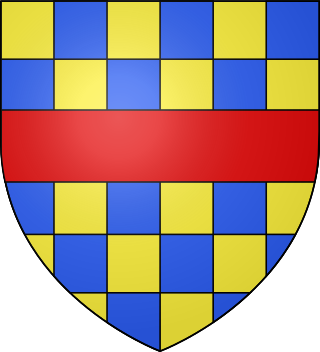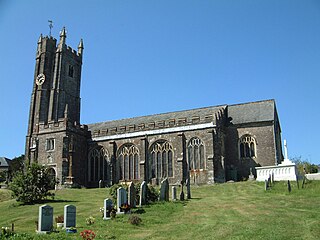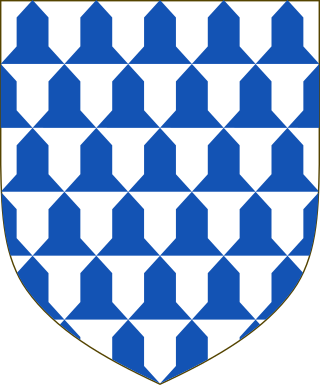
Henry de Bohun, 1st Earl of Hereford of Pleshy Castle in Essex, was an Anglo-Norman nobleman who became Hereditary Constable of England from 1199.
Richard de Clare, 3rd Earl of Hertford, feudal baron of Clare in Suffolk, and lord of Tonbridge in Kent and of Cardigan in Wales, was a powerful Anglo-Norman nobleman with vast landholdings in England and Wales.

William III de Cantilupe was the 3rd feudal baron of Eaton Bray in Bedfordshire, and jure uxoris was feudal baron of Totnes in Devon and Lord of Abergavenny. His chief residences were at Calne in Wiltshire and Aston Cantlow, in Warwickshire, until he inherited Abergavenny Castle and the other estates of that lordship.

Miles FitzWalter of Gloucester, 1st Earl of Hereford was a great magnate based in the west of England. He was hereditary Constable of England and Sheriff of Gloucestershire.

William de Redvers, 5th Earl of Devon, of Tiverton Castle and Plympton Castle, both in Devon, was feudal baron of Plympton in Devon.

Robert de Clifford, 1st Baron de Clifford, of Appleby Castle, Westmorland, feudal baron of Appleby and feudal baron of Skipton in Yorkshire, was an English soldier who became 1st Lord Warden of the Marches, responsible for defending the English border with Scotland.

William Bourchier, 1st Count of Eu, was an English knight created by King Henry V 1st Count of Eu, in Normandy.

Harberton is a village, civil parish and former manor 3 miles south west of Totnes, in the South Hams District of Devon, England. The parish includes the village of Harbertonford situated on the main A381 road. In the 2001 census the parish had a population of 1,285. The village is a major part of the electoral ward of Avon and Harbourne. At the 2011 census the ward population was 2,217.

William de Beauchamp, 9th Earl of Warwick was the eldest of eight children of William de Beauchamp of Elmley and his wife Isabel de Mauduit. He was an English nobleman and soldier, described as a “vigorous and innovative military commander." He was active in the field against the Welsh for many years, and at the end of his life campaigned against the Scots.

John de Beauchamp, 2nd Baron Beauchamp of Somerset was an English peer and was feudal baron of Hatch Beauchamp in Somerset.
William I de Moyon, 1st feudal baron of Dunster in Somerset, was seigneur of Moyon in Normandy and became Sheriff of Somerset in 1086. He founded the English de Mohun family in the Westcountry. Recorded in the Domesday Book of 1086 as a tenant-in-chief of William the Conqueror holding a number of manors in Somerset with caput at Dunster Castle.
Humphrey III de Bohun of Trowbridge Castle in Wiltshire and of Caldicot Castle in south-east Wales, 5th feudal baron of Trowbridge, was an Anglo-Norman nobleman and general who served King Henry II as Lord High Constable of England.
Humphrey II de Bohun of Trowbridge Castle in Wiltshire and of Caldicot Castle in south-east Wales, 4th feudal baron of Trowbridge, was an Anglo-Norman nobleman, the third generation of the Bohun family settled in England after the Norman Conquest of 1066.

In the kingdom of England, a feudal barony or barony by tenure was the highest degree of feudal land tenure, namely per baroniam, under which the land-holder owed the service of being one of the king's barons. The duties owed by and the privileges granted to feudal barons are not exactly defined, but they involved the duty of providing soldiers to the royal feudal army on demand by the king, and the privilege of attendance at the king's feudal court, the precursor of parliament.

The feudal barony of Okehampton was a very large feudal barony, the largest mediaeval fiefdom in the county of Devon, England, whose caput was Okehampton Castle and manor. It was one of eight feudal baronies in Devonshire which existed during the mediaeval era.
The feudal barony of Gloucester or Honour of Gloucester was one of the largest of the mediaeval English feudal baronies in 1166, comprising 279 knight's fees, or manors. The constituent landholdings were spread over many counties. The location of the caput at Gloucester is not certain as Gloucester Castle appears to have been a royal castle, but it is known that the baronial court was held at Bristol in Gloucestershire.
The feudal barony of Curry Mallet was an English feudal barony with its caput at Curry Mallet Castle in Somerset, about 7 miles east of Taunton.

The feudal barony of Clifford was a feudal barony with its caput baroniae at Clifford Castle in Herefordshire, England.

Baron St Maur was a barony created by writ in 1314 for the soldier Nicholas de St Maur, of Rode in Somerset.

The feudal barony of Eaton Bray in Bedfordshire was an English feudal barony founded in 1205 when the manor of Eaton was granted by King John to his household steward William I de Cantilupe (d.1239), together with many others, including Aston in Warwickshire. In 1221 Cantilupe built a castle at Eaton, which became the caput of his feudal barony and was described by the monks of nearby Dunstable Priory in the Annals of Dunstable as being "a serious danger to Dunstable and the neighbourhood". The grant was for knight-service of one knight and was in exchange for the manor of Great Coxwell, Berkshire, which had been granted to him previously but the grant was deemed compromised. Eaton had been held at the time of William the Conqueror by the latter's uterine half-brother Odo, Bishop of Bayeux, but later escheated to the crown.














